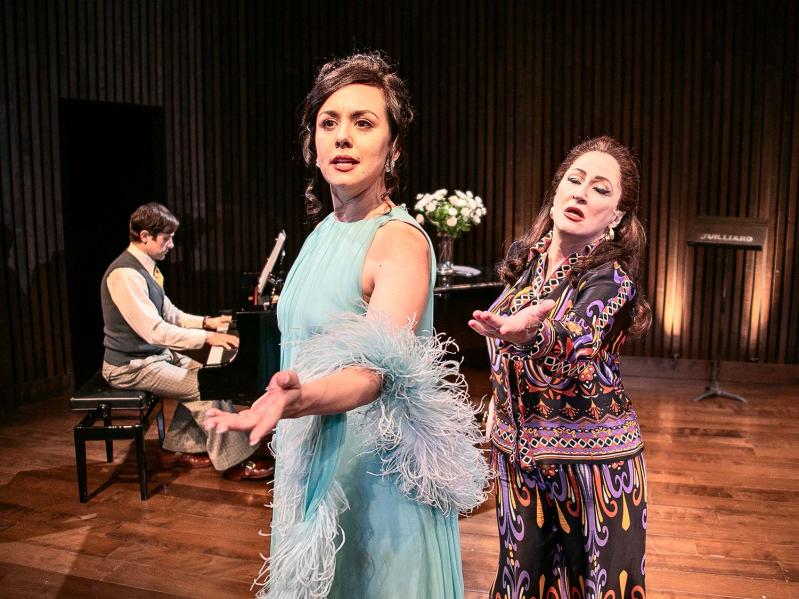Early into Bay Street Theater's production of "Master Class," I felt compelled to quickly scribble down a line. According to my semi-reliable handwriting, I wrote: "We are subjects to the music." Something about it stayed with me, and I kept thinking back on it as the play moved forward.
There has always been magic to music, and that is what this production captures so well. Music has a way of taking people back through their memories, like sleepwalking through a dream back to where the music imprinted itself. "Master Class" conveys how a lifetime in service to music can leave one forever caught in its grasp.
Written by Terrence McNally and first produced in 1995, "Master Class" drops the audience into a fictional opera master class run by the real-life opera star Maria Callas, as portrayed by Vicki Lewis, who is electric. Callas is a role that appears to be as demanding as the character is of her students. She is onstage the entire show, speaking most of the dialogue, and as the music brings out the memories of her career, she gives two incredible monologues, one at the end of each act.
And make no mistake, the audience is a part of this master class just as much as the students; we get to live it.
The students, played by Stella Kim, Rodney Ingram, and Olivia Hernandez, enter with an eagerness to learn and meet the force that is Callas. They each have an aria to work with, pieces from classic operas such as Bellini's "La Sonnambula" ("The Sleepwalker"), Puccini's "Tosca," and Verdi's "Macbeth," accompanied skillfully on piano by Brett Ryback as Manny Weinstock. (He also serves as the production's music director.) Ben Rauch rounds out the cast as a well-meaning stagehand who doesn't quite get the diva he's working with, providing some wonderfully funny moments opposite Ms. Lewis.
Ms. Kim, Ms. Hernandez, and Mr. Ingram performed the arias beautifully. Singing opera is hard, but hearing it live can be an extraordinary experience.
Ms. Lewis's Callas is not an easy teacher, and we get a sense of a demanding session through her tumultuous back and forth with Ms. Hernandez. Art can be harsh, especially at a high level.
Beneath the tough words, however, we see Callas convey a true desire to push these students to find a deeper meaning in the music. For them an aria may be just an aria, but as all good students of music and theater know, the intent behind a performance is what drives emotion to the audience. It is not enough to sing the music, one must listen to it and feel it as well.
Because of her great talent and stage presence during her career, Maria Callas earned the title of "La Divina" ("The Divine One"), and Ms. Lewis got that presence across throughout the play, owning the stage, commanding the audience's attention like a true diva of old. What surprised me most was how Ms. Lewis brought Callas's dedication to music to the forefront.
It amounts to a remarkable demonstration of the lengths one can go to be the best. Even without the powerful voice she was known for, Callas here is still subject to where the music takes her, whether it be physically to this master class or mentally through her memories.
"Master Class" runs through July 20. Tickets start at $49.99 at baystreet.org. It is directed by Lisa Peterson, with scene design by Rachel Hauck, production design by Yee Eun Nam, costumes by Laura Bauer, lighting by Jen Schriever, sound design by Sun Hee Kil, prop design by Audrey McGuane, and production stage management by Melissa Sparks.



